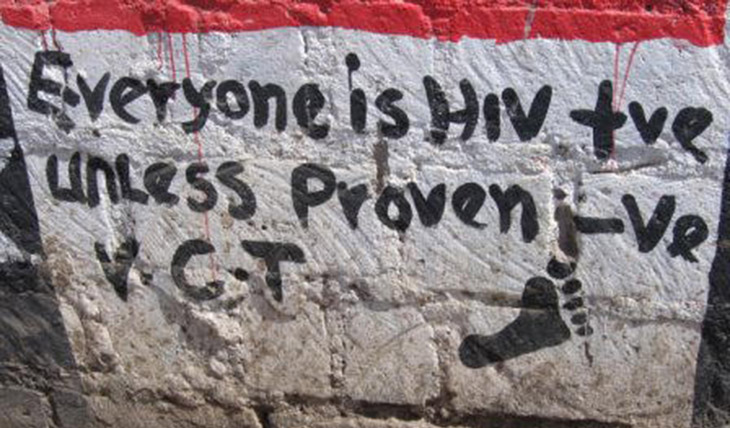The Health Policy Project ended in 2016. Work continued under Health Policy Plus (HP+) until 2022.
NEWS & VIEWS

Graffiti in the Mathare slum of Nairobi, Kenya, reminds residents that they are considered HIV positive until they test negative.
The message is meant to encourage participation in the free voluntary counseling and testing (VCT) service offered by the Kenyan government.
© 2005 Helen Dombalis, Courtesy of Photoshare
NAIROBI, Kenya—The Health Policy Project (HPP) team in Kenya recently provided technical assistance to Kenya to prepare a successful application for funds for HIV programs from the Geneva-based Global Fund for AIDS, Malaria and Tuberculosis (Global Fund). In April 2014, the Global Fund approved Kenya’s application for a grant of US$223 million to cover HIV activities between 2014 and 2017. HPP’s assistance in the process included conducting financial analyses that provided justification for the budget levels requested.
The HIV response in Kenya is heavily funded by donors, including the Global Fund and the United States President’s Emergency Fund for AIDS Relief (PEPFAR), which together contribute a significant proportion of the funds for HIV programs in Kenya. Although the Kenya government allocates funds each year for health programs, these funds are not adequate to meet comprehensive HIV prevention, care, and treatment needs in the country.
The Global Fund finances critical but under-funded areas of country’s response to the HIV and AIDS pandemic, such as HIV counseling and testing, provision of antiretroviral therapy (ART) services, care and support for chronic illnesses, and prevention of mother-to-child transmission services, among others. To access the funds, Kenya submits a comprehensive proposal for funding that should include appropriately budgeted activities, with correct estimations for the resources needed to achieve measurable results, in order to pass through the Fund’s rigorous application process.
In August 2013, the Ministry of Health asked the HPP Kenya team to provide technical assistance to cost the activities it was proposing under an existing grant to ensure correct estimates and adequate funds to achieve the intended results. In collaboration with the National AIDS Control Council (NACC) and the National AIDS & STI Control Programme (NASCOP), HPP conducted a costing analysis to establish the programmatic and resource gaps and the priorities that would be covered in the new application to Global Fund.
The analysis considered the costs of specific inputs required to increase the coverage of the HIV programs in the country, including human resources, drugs, procurements for supplies, and health products. It also took into consideration resources available from other key actors in Kenya’s HIV programs, including the government and development partners, to ensure there was no duplication in funding. The results showed that an annual deficit of over US$413 million existed in the HIV/AIDS program.
HPP discussed the results with the Ministry staff and other stakeholders involved in Kenya’s HIV programs, and used the input received from these discussions to revise the cost and resource gap estimations. HPP assisted the Ministry of Health to use the results and assisted in drafting the finance and budgeting section of the proposal to the Global Fund. The Ministry submitted the application in good time in September 2013. In April 2014, the Global Fund approved the application and Kenya received the maximum amount for which it could apply.
The new funds will cover activities for a three-year period and will enable the Ministry to implement the new guidelines for antiretroviral therapy recommended by the World Health Organization (WHO), and which extend ART coverage to all HIV patients with a CD4 count below 500. Under the new funding, Kenya will be able to offer ART treatment to an estimated 1 million adults and over 200,000 children in three years.
Dr. Martin Sirengo, head of NASCOP, said in a letter that HPP/Kenya’s “support was invaluable in the development of the procurement plan in line with the new WHO consolidated ARV guidelines 2013. [HPP] brought in [the] aspect of value for money, and improved on the efficiency and effectiveness of this grant.”
This activity was part of HPP’s technical package to support improved efficiency and effectiveness of Kenya’s health programs, especially HIV and AIDS. HPP in Kenya assists the Ministry of Health to apply evidence in the formulation of policies and program planning, and to select the most efficient and most effective approaches to providing HIV and AIDS health services. HPP expects to continue to work with the Ministry and NASCOP to use the budgeting tool that was used for the proposal to guide the use of the funds to ensure efficiency. HPP will also continue to build the capacity of NASCOP staff to conduct efficiency and effectiveness analyses to ensure the sustainability of evidence-based programming.
What's New
- Something to Build On: “Innovation Exchange” Celebrates the Health Policy Project’s Close and a New Beginning
- What Will it Take for Tanzania to Achieve ART Targets and Ensure Long-Term Sustainability of the HIV Response?
- Helping Kenya’s County Leaders Advocate for Increased Health Investments
- HPP Holds Working Meeting on Ensuring Responsible PEPFAR Transitions for Key Populations
- Health Policy Project Celebrates 2016 International Women's Day
- HPP Staff Participate in White House Conference on HIV Stigma Reduction

